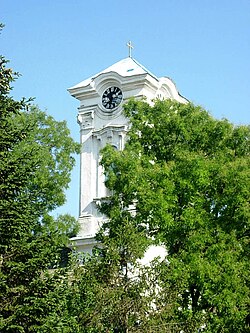Lokve, Alibunar
Lokve
| |
|---|---|
 The Romanian Orthodox church | |
| Coordinates: 45°09′06″N 21°01′31″E / 45.15167°N 21.02528°E | |
| Country | Serbia |
| Province | Vojvodina |
| District | South Banat |
| Government | |
| • Mayor | Darian Tapalaga |
| Area | |
| • Lokve | 1.1925 km2 (0.4604 sq mi) |
| Elevation | 76 m (249 ft) |
| Population (2011) | |
| • Lokve | 2,002 |
| • Density | 1,700/km2 (4,300/sq mi) |
| Time zone | UTC+1 (CET) |
| • Summer (DST) | UTC+2 (CEST) |
| Postal code | 26361 |
| Area code | +381(0)13 |
| Car plates | PA |
Lokve (Serbian Cyrillic: Локве, Romanian: Locve, Sân-Mihai or Simiai) is a village in Serbia. It is situated in the Alibunar municipality, in the South Banat District, Vojvodina province. The village has a Romanian ethnic majority (90.85%) and a population of 2,002 people (2002 census). The town often seems rather empty since more than half of population of Lokve lives abroad - mainly in USA and Switzerland.[1]
Name and Name History
[edit]In Serbian, the village is known as Lokve (Локве), in Romanian as Sân-Mihai or Simiai, and in Hungarian as Végszentmihály. The town name was changed from Saint Micheal when the town was invaded by the Nazi military forces during World War II.
Historical population and cemetery
[edit]| Year | Pop. | ±% |
|---|---|---|
| 1948 | 4,184 | — |
| 1953 | 4,246 | +1.5% |
| 1961 | 4,243 | −0.1% |
| 1971 | 3,826 | −9.8% |
| 1981 | 3,511 | −8.2% |
| 1991 | 2,450 | −30.2% |
| 2002 | 2,002 | −18.3% |
The Town has two cemeteries, one on each side of the town, and is only used for each side. Every family gets reserved spots on the cemetery.
Notable people
[edit]- Lazăr Sfera (1909–1992), Romanian footballer
See also
[edit]Sources
[edit]- Slobodan Ćurčić, Broj stanovnika Vojvodine, Novi Sad, 1996.
- Republika Srbija, Republički zavod za statistiku, Popis stanovništva, domaćinstava i stanova u 2002, Stanovništvo 1, Nacionalna ili etnička pripadnost - podaci po naseljima, Beograd, Februar 2003.
- Na temeljima gde je prvobitno bilo smešteno naselje pronađeni su praistorijski predmeti i jedan srebrni denar iz doba kralja Domicijana (51 - 96. pre n.e.). U ataru susednog sela Janošik pronađeni su temelji kuće iz doba Rimljana i kraljevski novac. Prilikom iskopa temelja Crkve u Alibunaru pronađen je novac sa amblemom Rima i natpisom Vibius, Tribarianus, Gallus.
References
[edit]Notes
[edit]External links
[edit]Cities, towns and villages in the South Banat District | |
|---|---|
| Pančevo | |
| Alibunar | |
| Bela Crkva | |
| Vršac | |
| Kovačica | |
| Kovin | |
| Opovo | |
| Plandište | |
(*) bold are municipalities or cities | |
Text is available under the CC BY-SA 4.0 license; additional terms may apply.
Images, videos and audio are available under their respective licenses.



